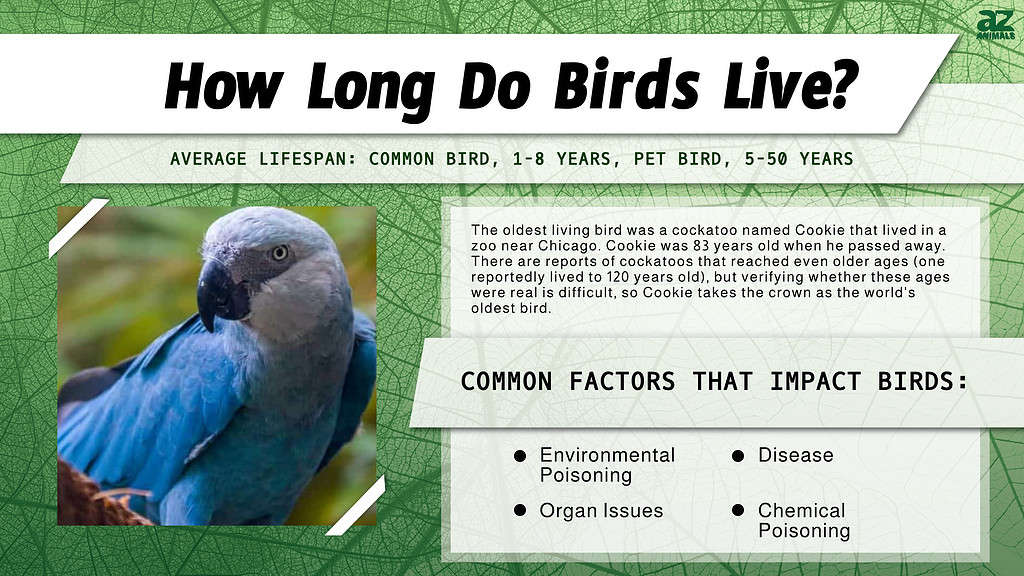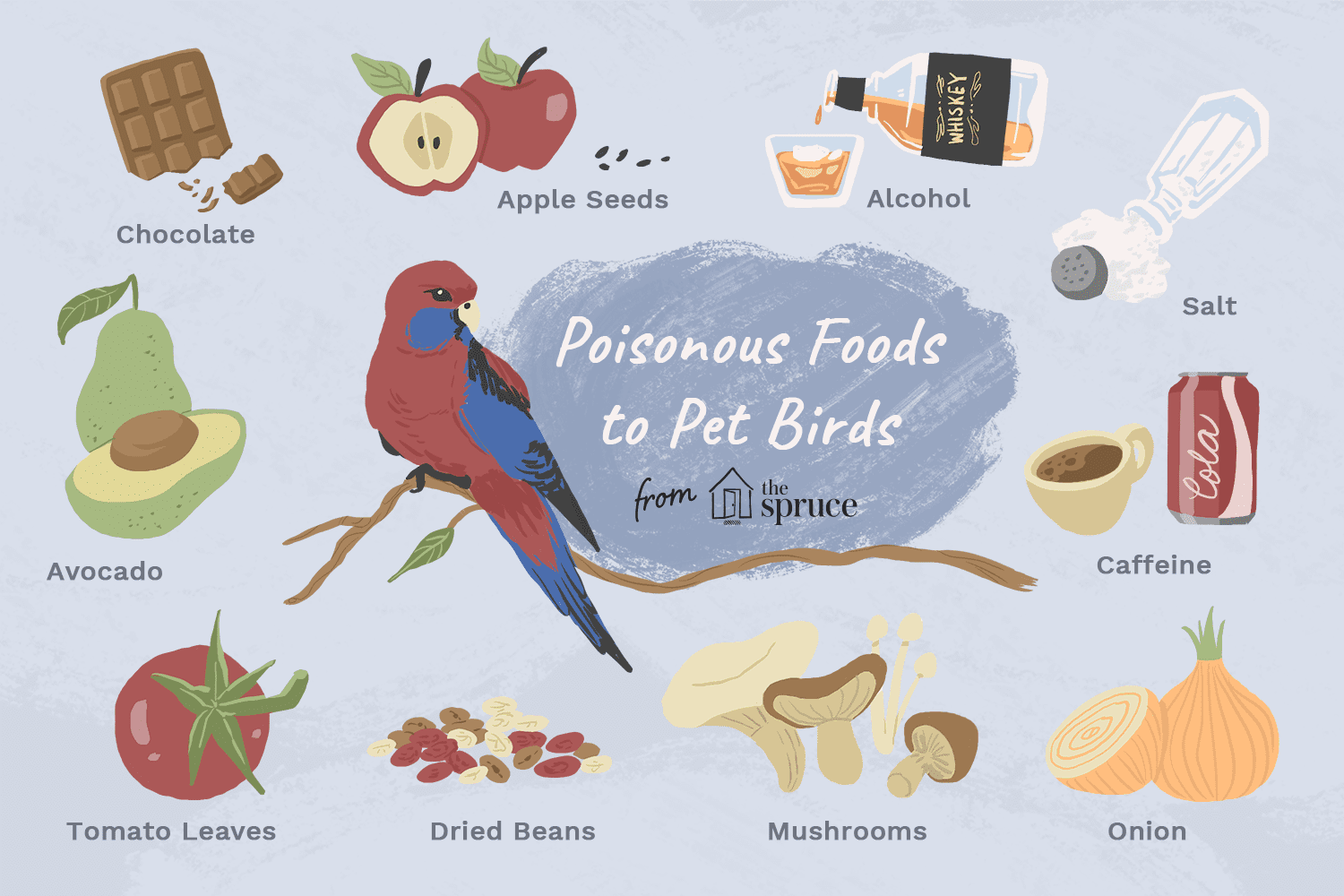15 common foods that can poison your bird include xylitol, avocado, chocolate, onion, salt, mushroom, fruit pits and apple seeds, caffeine, garlic, scallions, dairy products, cassava (tapioca), certain plants, grit and mushrooms. (source) Birds are delicate creatures and need a specialized diet to maintain their health and well-being.
However, there are several common foods that can be toxic and potentially fatal to birds if ingested. It is important for bird owners to be aware of these foods and avoid giving them to their feathery friends. We will discuss 15 common foods that can be poisonous to birds and explore why they should be avoided.
So, if you own a bird or are considering getting one, read on to learn about these harmful foods and how to keep your avian companion safe and healthy.

Credit: a-z-animals.com
Common Foods That Can Poison Your Bird
Feeding your bird certain human foods like chocolate, onions, and avocados can be harmful. It’s important to know which common foods can poison your bird and only feed them foods recommended by your veterinarian.
When it comes to providing a safe and healthy diet for our feathered friends, it’s crucial to understand the common foods that can poison your bird. Certain human foods that seem harmless to us can be extremely toxic to birds. In this article, we will explore the specific foods that are toxic to birds and discuss how to prevent food poisoning in our avian companions.
It’s important to be aware of the specific foods that can be harmful to birds:
- Xylitol: This artificial sweetener commonly found in gum and sugar-free products can cause liver failure in birds.
- Avocado: While a nutritious choice for humans, avocados contain a toxin called persin that can be lethal to birds.
- Chocolate: This delicious treat contains theobromine, which is highly toxic to birds and can cause vomiting, diarrhea, and even death.
- Onion: Onions and other members of the allium family can damage a bird’s red blood cells and lead to anemia.
- Salt: Excessive salt intake can result in dehydration, kidney damage, and other health issues in birds.
- Mushroom: Certain varieties of mushrooms can be toxic to birds and may cause digestive problems or even organ failure.
To ensure the well-being of our feathered friends, it’s essential to take the necessary precautions to prevent food poisoning:
- Consult with a veterinarian: Always seek professional advice from a qualified avian veterinarian to determine the appropriate diet for your bird.
- Avoid feeding human foods: Stick to bird-specific food items and avoid sharing your meals with your bird, as many human foods can be harmful.
- Secure food storage: Store bird food in proper containers to prevent contamination and ensure freshness.
- Be cautious with treats: Only provide treats that are specifically made for birds and avoid those that may contain toxic ingredients.
- Regularly clean food and water dishes: Proper hygiene is crucial to avoid bacterial contamination of food and water.
By following these guidelines and being aware of the specific foods that can poison your bird, you can provide a safe and healthy diet for your avian companion.
Introduction To Bird Food Poisoning
Introduction to bird food poisoning: Learn about the 15 common foods that can poison your bird, including chocolate, onions, and avocados. It is essential to feed your bird only foods recommended by your veterinarian to prevent food poisoning.
Dangers Of Feeding Human Foods To Birds
Feeding our pet birds can be a rewarding and enjoyable experience, but it’s important to be aware of the potential dangers that certain human foods can pose to our feathered friends. Many common foods that we consume on a daily basis can actually be toxic to birds, causing serious health issues and even death.
One common mistake that bird owners make is offering their pets caffeinated beverages like coffee or tea. Caffeine can have a stimulating effect on humans, but for birds, it can be extremely toxic. Similarly, chocolate, a treat enjoyed by many of us, contains theobromine, which is harmful to birds and can lead to seizures or even cardiac arrest.
Onions and garlic, often used to add flavor to our meals, contain a compound called thiosulfate, which can cause anemia in birds. High levels of salt can be detrimental to their delicate systems, leading to dehydration and kidney damage. Even avocados, considered a healthy food for humans, can be deadly to birds due to a substance called persin, which can cause heart failure.
Importance Of Feeding Only Vet-recommended Foods
Given the potential risks of feeding human foods to birds, it is crucial to stick to a diet that is specifically designed for their nutritional needs. Consulting a veterinarian who specializes in avian care is the best way to ensure that you are providing your bird with a safe and balanced diet.
Veterinarians have detailed knowledge of the specific dietary requirements of different bird species and can recommend appropriate commercial bird food products or assist in creating a homemade diet that meets their nutritional needs. These specially formulated foods provide the right balance of proteins, carbohydrates, fats, vitamins, and minerals that birds need to thrive.
Additionally, a vet-recommended diet can help prevent deficiencies that can lead to health problems such as feather plucking, weakened immune systems, and reproductive issues. By feeding your bird the appropriate foods, you are promoting their overall well-being and increasing their chances of living a long and healthy life.
In conclusion, when it comes to feeding our beloved feathered companions, it is essential to avoid giving them human foods that can be toxic. Instead, prioritize a diet that is recommended by a veterinarian specifically for your bird’s species. By doing so, you’ll be ensuring that your bird receives the proper nutrition it needs to thrive and stay healthy.
Specific Foods That Are Toxic To Birds
Certain foods can be toxic to birds, such as chocolate, avocado, onions, and salt. It’s important to avoid giving your bird these foods and stick to a diet recommended by a veterinarian.
Xylitol
Xylitol is a common sugar substitute found in many products, such as sugar-free gum, candy, and baked goods. It can be extremely toxic to birds if ingested. Xylitol can cause a sudden release of insulin in a bird’s body, leading to a dangerous drop in blood sugar levels. Symptoms of xylitol poisoning in birds include vomiting, loss of coordination, and seizures. It is important to keep any products containing xylitol out of reach of your feathered friend.
Avocado
Avocado is a popular fruit with humans, but it can be deadly for birds. The flesh, pits, leaves, and bark of the avocado plant contain a toxin called persin, which can cause severe respiratory distress and heart failure in birds. Symptoms of avocado poisoning in birds include difficulty breathing, weakness, and sudden death. It is best to avoid feeding your bird any part of the avocado plant.
Chocolate
While chocolate is a delicious treat for humans, it should never be given to birds. Chocolate contains theobromine, a compound that is toxic to birds (as well as dogs and cats). Theobromine can cause vomiting, diarrhea, increased heart rate, and even seizures in birds. It is important to keep all chocolate products away from your feathered friend to prevent accidental ingestion.
Onion And Garlic
Onions and garlic may add flavor to our meals, but they should never be included in a bird’s diet. Both onions and garlic contain a substance called thiosulphate, which can damage a bird’s red blood cells and lead to anemia. Symptoms of onion and garlic poisoning in birds include weakness, pale gums, and difficulty breathing. Make sure to remove any onion or garlic from your bird’s food before offering it to them.
Salt
Salt is an essential mineral for our bodies, but it can be harmful to birds in large quantities. Birds have a different metabolism than humans, and excess salt can disrupt their electrolyte balance. Too much salt can lead to dehydration, increased thirst, and kidney damage in birds. Avoid offering your bird salty foods like chips or pretzels, and be cautious of the salt content in any human foods you may share with them.
Mushrooms
Mushrooms are a tasty and nutritious food for humans, but many varieties can be toxic to birds. Some wild mushrooms contain toxins that can cause liver failure and digestive issues in birds. It is best to avoid feeding any mushrooms to your feathered friend, especially if they are foraged from the wild. Stick to bird-safe fruits and vegetables for a healthy diet for your bird.

Credit: www.healthline.com
Preventing Food Poisoning In Birds
When it comes to keeping our feathered friends healthy, it’s essential to monitor their diet and ensure they don’t consume any foods that could potentially harm them. Birds have sensitive digestive systems, and certain foods that are harmless to humans can be toxic to them. To prevent food poisoning in birds, it’s crucial to understand the most toxic things for birds, the foods that are bad for them, and the foods that should never be fed to them.
The Most Toxic Things For Birds
Some substances can have severe and sometimes fatal effects on birds. It is important to be aware of these toxic things:
- Caffeine: Can cause heart palpitations, hyperactivity, and even death in birds.
- Chocolate: Contains theobromine, a compound that is toxic to birds and can lead to various symptoms, including tremors and seizures.
- Onions and Garlic: Contain compounds that can damage a bird’s red blood cells and lead to anemia.
- Salt and Fat: Excessive sodium and high-fat foods can disrupt a bird’s electrolyte balance and lead to various health issues.
- Fruit Pits and Apple Seeds: Contain cyanide, which can be toxic to birds in large amounts.
- Xylitol: A common sweetener found in sugar-free gum and other products, xylitol can cause a sudden release of insulin in birds, leading to hypoglycemia and liver failure.
- Smoke and Other Aerosols: Birds have delicate respiratory systems and can be easily harmed by inhaling smoke, aerosols, or fumes from certain cleaning products.
- Teflon: The fumes produced when Teflon-coated cookware is overheated can cause respiratory distress and even death in birds.
Foods That Are Bad For Birds
While some foods are not necessarily toxic, they can still be harmful to birds when consumed in large quantities or as a regular part of their diet. These foods include:
- High-Fat, High-Sodium, High-Sugar Foods: Excessive consumption of these foods can lead to obesity, diabetes, and other health issues in birds.
- Sugar-Free Candy: Many sugar-free candies contain xylitol, which, as mentioned earlier, can be highly toxic to birds.
- Peanuts: While peanuts are a common bird food, they can sometimes contain a toxin called aflatoxin, which can be harmful in large amounts.
- Certain Plants: Some plants, like avocado and comfrey, are toxic to birds and should never be included in their diet.
- Grit: Contrary to popular belief, birds do not require grit for digestion and excessive consumption can cause digestive issues.
- Dairy: Birds are lactose intolerant and cannot properly digest dairy products.
- Mushrooms: Some mushrooms can be toxic to birds and should be avoided.
Foods That Should Never Be Fed To Birds
There are some foods that should never be fed to birds under any circumstances. These include:
- Avocado: Contains persin, a toxin that can cause respiratory distress and heart failure in birds.
- Caffeine: Found in coffee, tea, energy drinks, and certain soft drinks, caffeine can have severe effects on a bird’s nervous system.
- Chocolate: As mentioned earlier, chocolate contains theobromine, which can be toxic to birds.
- Salt: Excessive salt intake can lead to electrolyte imbalances in birds, causing dehydration and other complications.
- Fat: Birds cannot metabolize high amounts of fat and too much can lead to obesity and associated health problems.
- Fruit Pits and Apple Seeds: These contain cyanide, which is toxic to birds and can lead to poisoning.
- Onions and Garlic: Both these ingredients can damage a bird’s red blood cells and cause anemia.
- Xylitol: Just a small amount of xylitol can be lethal to birds, so it’s crucial to keep anything containing this sweetener away from them.
By being aware of these toxic foods and preventing their consumption, pet owners can ensure the health and well-being of their avian companions. Always consult with a veterinarian to ensure birds are receiving a proper and balanced diet suitable for their species. With careful attention to their diet, birds can live long and healthy lives.

Credit: www.healthline.com
Frequently Asked Questions On 15 Common Foods That Can Poison Your Bird
What Food Poisons Birds?
Many human foods can poison birds. Coffee, chocolate, and potato chips can be harmful. Onions and avocados, although seemingly harmless, should not be part of their diet. It is best to feed birds only foods recommended by a veterinarian.
What Is The Most Toxic Thing To Birds?
Caffeine, chocolate, onions and garlic, salt and fat, fruit pits and apple seeds are the most toxic things to birds. It is important to avoid feeding your bird any of these foods to keep them safe and healthy.
What Foods Are Bad For Birds?
Foods toxic to birds include chocolate, avocado, onions, garlic, fruit pits, apple seeds, caffeine, salt, fat, and xylitol. These should never be fed to birds as they can be harmful or even fatal. Stick to foods recommended by your veterinarian to ensure your bird’s health.
What Is Toxic To Birds And Should Never Be Fed To Them?
Birds should never be fed toxic foods such as cassava, caffeine, dairy products, onion, garlic, scallions. These foods can be harmful and should be avoided. Stick to a diet recommended by your veterinarian to ensure your bird’s health and safety.
Conclusion
When it comes to feeding your beloved bird, it is crucial to be aware of the common foods that can be poisonous to them. From chocolate and avocados to onions and salt, certain human foods may seem harmless but can have detrimental effects on your feathered friend’s health.
To prevent food poisoning in birds, it is best to stick to a diet recommended by your veterinarian. By being vigilant about what your bird consumes, you can ensure their well-being and happiness.

